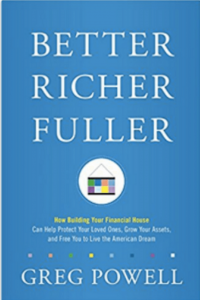The following is a guest post by Greg Powell, author of Better, Richer, Fuller: How Building Your Financial House Can Help Protect Your Loved Ones, Grow Your Assets, and Free You to Live the American Dream. If you’d like to submit a guest post, check out Money Q&A’s guest posting guidelines for more information.

If you are building your dream house you wouldn’t give your money to an architect or builder who after an hour says to you, “I’ve gotten enough ideas, I’ll start on your house tomorrow.” No, you would review with an architect the vision you have of your home, how many rooms, bathrooms, fireplaces, and etcetera. Then the architect would develop a set of blueprints from which the builder and construction team would work.
Too often in the financial services industry, the “I’ve gotten enough ideas” approach is used by advisors when someone meets them for the first time and begins to share their vision for their life.
Financial planning doesn’t have to be complex or intimidating. However, it does need to be in depth and take into account the dreams and goals of your life and your family. There are questions in the financial blueprint process that everyone needs to ask or have discussions about.
I emphasize that everyone needs a financial blueprint. Like someone who sits down with a builder and shares their ideas of how the house will look on the lot they have purchased for construction. Every individual needs to have a discussion with a financial advisor that is detailed and thorough so that advisor fully understands what the investor is trying to achieve.
The Your Financial House process outlined in the book is designed to go room by room through different topics and questions. So often people focus purely on retirement planning in the planning process, yes it is one of the categories that needs to be discussed, but the symbolism of using the house blueprint demonstrates its more than you. It’s about the relationships in your life – a special needs child, aging parents, a career transition.
It’s asking questions with all of the things going on in your life how can you stay on track and achieve financial freedom. Like every house, a financial blueprint may require you to renovate, reconstruct or even clean up a room but the symbolism the dialogue and the number crunching – allows you to make sure you are on track as well as what you need to tweak to build a solid house.
Don’t let financial terminology or the insecurity of not knowing what to ask prevent you from building your financial house – it is the way to make sure that your story, your American dream stays on track.
Here’s a list of questions (for more in-depth list, go to yourfinancialhouse.com) to ask yourself and think about as you construct your financial blueprint and build a solid financial house. Spend some time reflecting and be very specific – don’t just say, I want to retire at age 68, but instead say, I want to retire at age 68 with the ability to live in my current house, and take my family on a cruise to Alaska.
- Dreams – What would you do if money were no object?
- Legacy – What do you want to be known for? Philanthropy, Values
- Lifestyle– How do you want to live? This isn’t about going on a budget, this is about reconciling the lifestyle you have now with the lifestyle you want to have one day
- Wealth – What exactly are your assets and liabilities? List them out, discover your true net worth –
- Financial Opportunity – Analyze your investment objectives, time horizon – when do you want to retire? What’s your risk tolerance to determine what successfully achieving your financial goals looks like?
- Children and Heirs – As you work towards retirement, what relationships have an impact on your goals? Or upon your death, who might you have to continue to care for – a special needs child, dependent parents – the list goes on.
- Retirement Fulfillment –You need to know you have the financial wherewithal to retire, but you must also enjoy your retirement. What will you do upon retirement?
- Estate Planning – Is your Will, Medical Directive, Guardianship for any dependent children, trust and any other legal document current?
Designing your financial blueprint doesn’t have to be difficult. In fact, spending the time to create a blueprint gives you a solid financial house from which to enjoy the freedom that financial success brings.
Greg Powell is the author of Better, Richer, Fuller: How Building Your Financial House Can Help Protect Your Loved Ones, Grow Your Assets, and Free You to Live the American Dream. Powell has over thirty years of experience within the financial industry and holds the CIMA®, certified investment management analyst, designation. His firm, Fi Plan Partners, uses the Your Financial House® process to help their clients pursue better, richer, fuller lives.
